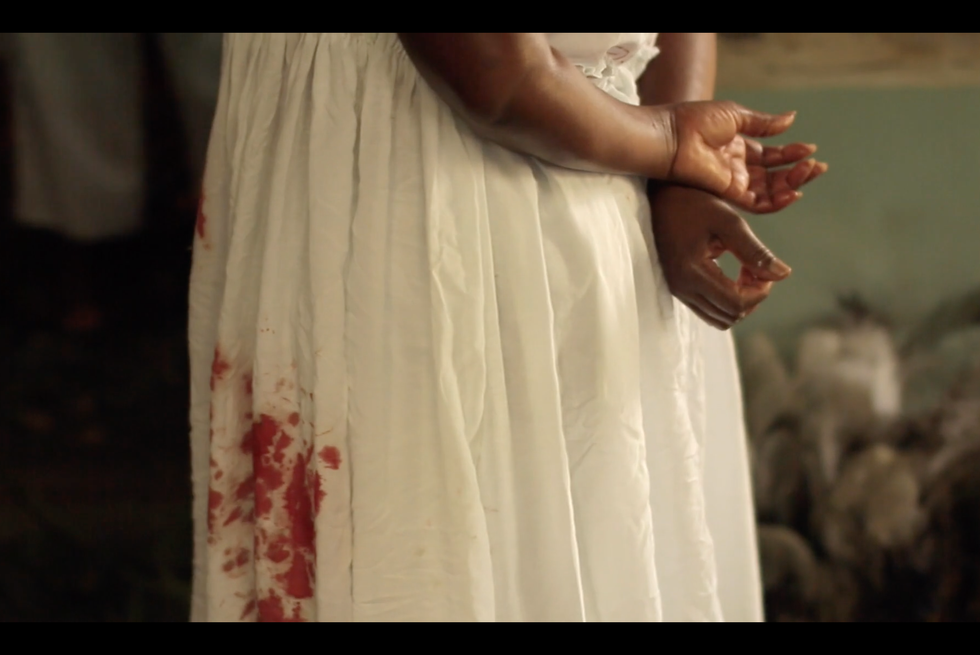Philosophy's Grubby Fingers
From the Series: The Possibility of Spirits
From the Series: The Possibility of Spirits

The Possibility of Spirits is a fluid, engaging, challenging film that directly takes up the complex terrain named in the title in a way that engagingly weaves expertise, humor, and empathy into the fabric of the narrative. I say "fabric" because the director’s contemplation of fabrics (specifically, the white fabric used in the Candomblé rituals) plays a key role in bringing the threads of his explorations of Candomblé religion in Brazil together as a singular work. Director Mattijs van de Port is very good at taking something overlooked and, in an unobtrusive way, drawing what seems to be simple curiosa into visibility and a connection to a larger whole.
Saying this, one of the threads in the narrative fabric van de Port weaves frays at the edge of his cinematic cloth. I will, in the space remaining, sympathetically pull at this thread to test if the entire cloth unravels. I am referring specifically to the puzzling enmity the filmmaker expresses towards "philosophy" in accounting for that which is unseen, unnamed, and by "our" standards, unknowable. “How would you turn this bloody mess [Candomblé ritual] into philosophy?” van de Port asks over the image of a brilliantly white dress splattered with the blood of a sacrificed animal, his tone implying the perversity of even trying to think Candomblé, at least by these terms. The sciences, and anthropology in particular, are framed as naïvely empiricist and disenchanted and fare little better. Fair enough—the sciences (social or otherwise) remain, if able to see nearly everything, famously inept in accounting for evidence of forces that stubbornly remain unseen and unprovable. Nevertheless, is this contrast not a false problem? And can we say (as the filmmaker more-or-less does) that Candomblé is better able to confront and think the unseen, or the Other, over those techniques of grasping the world negatively rendered in the film?
Pulling this thread does unknit the narrative weave of the film a bit but, in the end, it does not unravel. Indeed, The Possibility of Spirits as a cinematic work hangs together even under this pressure, passing my somewhat devious test. The central question remains, however—why express a scorn for science and philosophy that seems more a crowd-pleasing move than a thought-out claim rooted in an enlightening observation (realizing that "enlightenment" and even "thinking" itself are felt to be perverse affectations nowadays)? The demand to think what is unseen, unthought, and yet somehow "known" sits as the central problem of living in everything from the Hebrew Bible to Heidegger and marks the abyss of our present circumstances. Thus, it is arguable that the filmmaker has enacted something of a sleight of hand, in that the film presents a fragment of what we might properly call philosophy after all. Candomblé ritually addresses this impossible engagement with unseen forces, and it is clear from van de Port’s own elliptical, lyrical approach, that the struggle to think, act, and live in the face of such aporias compels what we see in the film. And yet, ultimately, "they" (like "we") fail to bridge the distance. Certainly, "philosophy" and "science" is shown to miscarry in The Possibility of Spirits, as the very "possibility" referred to in the title signals the limits of both. It also signals Candomblé’s own limits as a practice, in that giving names to, and devising procedures for, actions within this aporetic zone in the end only leaves the practitioners grasping at air, struggling to think through why the orixá, like all others worthy of the name Other, capriciously withdraw after raising our hopes that they are present to us, for us. The filmmaker would clearly resist my interpretation, but his surprising move to end the film by attributing the work’s existence, in the register of a series of "facts" and "events," to the intervention of Obaluaê (orixá of smallpox and infectious diseases) only serves to mark this shared limit, quixotically giving a name to a being that resists naming and claiming to know something that exceeds what it means "to know."
I highly recommend watching The Possibility of Spirits and giving oneself over to the folds of its cinematic fabric—do not, however, unfairly expect that this lustrous visual cloth will serve to cover that nakedness of existing in a world where either God, the gods, or Being (take your pick) always, always withdraws. After all, that Other, like Candomblé’s brilliantly white cloth, is incredibly difficult to film.